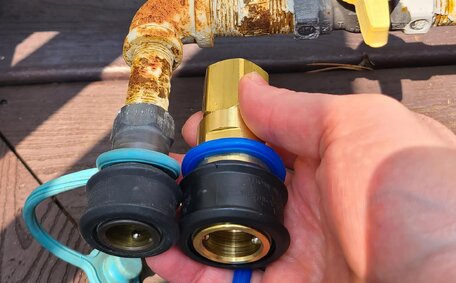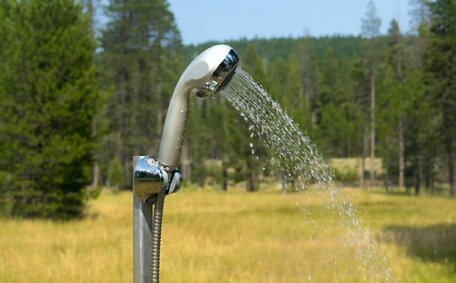Introduction to Hot Water Systems
Choosing an efficient hot water system, either electric or gas, is essential for energy and cost savings in the home.
An electric storage hot water heater heats water using an electrical element inside the tank. Gas tank systems use a gas burner to heat a storage tank or to serve as instant hot water systems as it flows through the system.
In selecting a new hot water system, consider running costs, energy efficiency, environmental impact, and maintenance. This comparison of electric and gas systems will help homeowners make an informed decision.
Comparing Electric and Gas: Efficiency and Energy Use
Key considerations in water heating efficiency are energy consumption and its conversion to usable heat.
Electric hot water systems tend to have a higher energy conversion efficiency, with around 90-95% of the electrical energy they consume transforming into usable heat for your home. Nonetheless, electricity generally costs more per unit, which impacts the running expenses of your water heater.
Gas water systems have a lower conversion efficiency of around 75-80%, losing more energy in the process compared to electric models. But in the gas vs electric cost analysis, natural gas costs less per unit of energy than electricity in most areas.
While electric systems are more energy-efficient, gas systems benefit from using less costly energy sources. Finding the best balance between gas and electric water systems depends on local energy costs and individual hot water consumption patterns.
Electric Hot Water Systems
Electric systems employ electrical heating elements submerged in a storage tank, enhancing the system’s effectiveness in water heating. There are two main types of hot water heaters - conventional storage and heat pump system models.
Conventional Electric Storage
The most common electric systems have two heating elements in an insulated hot water tank. Water is heated and stored as storage hot water for on-demand use. This type water heater is relatively affordable to purchase but can be expensive to run over time.
Electric Heat Pump
Electric water heaters with heat pump technology are more energy-efficient than traditional models. Heat pump water systems operate by absorbing warmth from the surrounding air and transferring it to the water. Heat pump systems generate up to three times more heat energy than the electricity they consume.
Electric water heaters that use heat pump technology have higher upfront costs but can significantly reduce your monthly energy bills over time. They are more efficient when integrated with heat pump solar systems to utilise renewable power and maximise self-sufficiency.
Energy Use and Running Costs
Electric storage systems depend on electricity, typically more expensive per unit than gas. However, increasing solar hot water systems integration is helping offset these expenses for many homes, balancing your energy costs even further.
Though heat pumps are less energy-intensive than traditional electric systems, running costs can still fluctuate based on local energy rates, climate, and energy source for the system.
Gas Hot Water Systems
Gas water heaters employ a gas burner to heat water in a tank or provide instant heating. Continuous flow heating methods typically have an energy efficiency rating of 75-80%, lower than usually more efficient heat pump technologies.
Gas hot water systems, despite being less efficient in fuel conversion, generally have lower running costs. Natural gas prices are lower per unit of energy compared to electricity.
Furthermore, as an energy saver, modern gas systems utilise advanced burner technologies for improved efficiency, akin to the benefits offered by tankless water heaters. Modern condensing gas heaters, which can use gas lpg, capture additional heat, while tankless models provide instant continuous hot water without standby energy losses.
Gas hot water systems emit carbon from the combustion of gas. However, integrating a solar hot water system with high-efficiency models can significantly reduce greenhouse gas output. Natural gas can also supplement renewable energy to offset fossil fuel reliance.
Professional gas fitting is required for the safe installation of gas hot water systems. Homes need an existing or new gas line with adequate capacity and ventilation. Once installed, gas systems require minimal maintenance apart from annual burner tuning.
Operating and Maintenance Costs
Choosing a hot water system involves considering the total cost of ownership beyond the initial purchase price. Lifetime operating and maintenance expenses significantly impact the overall investment of a hot water system.
In general, electric hot water systems are more expensive to purchase but have lower maintenance requirements. Gas systems are generally less costly to install than gas electric water system counterparts, but servicing like annual burner tuning is essential.
Running costs depend primarily on local energy prices and household usage patterns. Electricity is typically more expensive per unit than natural gas. However, advanced heat pump electric systems can offset higher tariffs by being more energy efficient.
To accurately estimate and compare total lifecycle costs, homeowners need to consider the system your home will rely on and calculate long-term energy prices alongside regular maintenance fees.
Electric Hot Water Running Costs
The running costs of electric hot water systems primarily come down to electricity prices and usage patterns. Electricity tariffs are typically higher than natural gas, but advanced systems can reduce energy requirements.
Traditional electric storage units have substantial standby losses from water slowly cooling in the tank. This requires the heating elements to activate regularly to maintain temperatures. Over 25% of energy input can be lost this way.
Daily hot water usage directly impacts running costs. Infrequent use leads to high standby losses, while heavy usage requires more heating. Light, efficient usage provides the best cost profile.
Electric Heat Pumps
Electric systems that pump hot water using heat pump technology can cut energy needs by up to 75% per year compared to conventional electric systems. Utilising a solar heat pump can lead to even lower running costs in most homes.
Seasonal variations also affect heat pump efficiency. Performance of heat pumps declines in winter when extracting heat from the air is harder, meaning there’s no constant optimal efficiency throughout the year. So electricity needs may be higher in colder climates.
Overall, advanced electric heat pumps can realise significant long-term savings from lower utility bills. Their economic viability depends greatly on electricity prices and individual usage.
Gas Hot Water Running Costs
Gas hot water systems generally have lower operating costs compared to electric alternatives. This is driven by natural gas prices typically being cheaper per unit than residential electricity.
However, running costs ultimately depend on local energy rates, system efficiency and household hot water usage patterns.
Key Variables in Gas Hot Water Costs
The main variables that impact ongoing gas hot water expenses are:
- Cost of natural gas - If local gas prices are high, savings vs electric systems may be marginal.
- System efficiency rating - Modern gas hot water units with higher energy star ratings use less gas.
- Household hot water demand - Infrequent use reduces efficiency as water cools in the tank.
- Regular maintenance - Annual burner tuning improves safety and efficiency.
Homes with access to low gas prices and efficient models benefit from lower operating costs. But gas systems are not necessarily the most economical option in every situation.
Environmental Impact
When considering environmental impact, both gas electric hot water systems produce some level of greenhouse gas emissions and resource consumption. However, there are some key differences.
Electric Hot Water Systems
The environmental impact of hot water systems largely depends on the electricity source. Systems running on fossil fuel-generated electricity tend to have higher carbon emissions. However, units powered by renewable energy like solar have extremely low ecological footprints.
In general, heat pump electric systems are the most environmentally friendly electric option. Their improved efficiency reduces overall energy use and associated emissions.
Gas Hot Water Systems
Gas hot water systems directly burn natural gas as their fuel source. This combustion process releases carbon dioxide and other greenhouse gases. High-efficiency condensing units minimise emissions, but a byproduct is still produced.
One way gas systems can reduce their footprint is by offsetting natural gas use with renewable power. Solar, wind or hydro energy can supplement gas to cut net emissions.
The Renewable Switch
Eco-conscious homeowners can choose hot water systems that use renewable energy sources. Solar hot water and heat pump systems powered by solar PV or wind offer low-carbon alternatives.
Transitioning more of our energy supply to renewables will help drive down the environmental footprint of hot water systems and home appliances in general moving forward.
Factors to Consider When Choosing a System
When deciding which hot water system to select, there are several key factors homeowners should consider before making this major investment:
Upfront and Operating Costs
Weigh up the initial purchase price, installation cost, and projected energy bills to find the right hot water system for your home. Systems that pump hot water using heat pump technology have higher upfront costs but are less expensive in terms of electricity long-term. Gas systems are cheaper to install but rely on gas prices staying low.
Energy Efficiency
Contemporary gas and electric heat pump systems show improved water and energy efficiency. Check official energy star ratings to estimate potential savings. Location also impacts efficiency - heat pumps perform better in temperate climates.
Environmental Impact
Electric water systems paired with solar panels have extremely low emissions. High-efficiency gas units with renewable power supplementation have reduced carbon output. Consider sustainability goals before choosing.
Space Constraints
Tankless systems, which are space-saving and efficient, supply instant hot water. Split electric heat pumps that separate the tank from the heat exchanger provide efficient heating and water delivery. Measure available room for hardware during planning. Professional installation is also advised to fully realise your water system’s potential benefits.
Evaluating these crucial factors—costs, efficiency, emissions, and size—will help homeowners choose the best hot water system for their specific needs.
Available Rebates and Incentives
There are often rebates and incentives available for installing energy-efficient hot water systems, which can help reduce the upfront cost. It’s important to research current offers in your state or region when choosing a system.
Government Rebates
Local and federal governments often offer rebates for high-efficiency electric heat pump and gas systems. These rebates fluctuate, yet they can slash system costs considerably, sometimes saving hundreds or even thousands of dollars.
Energy Supplier Offers
Electricity and gas providers sometimes offer discounts for eco-friendly hot water solutions. This is part of incentive schemes to reduce overall energy consumption.
Check with utility providers for offers like discounts or smart meter incorporations when updating your hot water system.
Solar and Heat Pump Packages
Companies that install solar panels and heat pumps often bundle hot water system upgrades into overall home sustainability packages. Purchasing multiple upgrades together can realise further discounts through combined installation.
Exploring all available rebates and creative bundling opportunities maximises savings on the cost of transitioning to the system best suited to meet the efficiency needs of your household.
Conclusion and Recommendations
Choosing between electric and gas hot water systems involves considering multiple factors. Key considerations around the type of water system efficiency, operating costs, environmental footprint and installation requirements make selecting the optimal system a complex decision.
Overall, modern Modern energy efficient water heat pump and condensing gas systems offer the most attractive combination of efficiency and affordability. Electric heat pumps excel at energy conservation but rely on electricity prices remaining reasonable. High-efficiency gas units provide a low operating cost route while tackling emissions through innovation.
The suitability of a hot water solution largely hinges on individual household requirements, from energy costs and consumption habits to available space. Seeking professional advice can provide custom insight for your situation.
Our team at Gladesville Plumbing have experience in tailoring solutions to your specific needs, including the installation and maintenance of all types of hot water systems. For personalised recommendations on selecting, upgrading or repairing your hot water unit, call us on 1300 349 338 or email to book a consultation.
An expert plumber will evaluate your home, budget and lifestyle factors to propose the most suitable electric, gas or solar system solutions. Investing in the right hot water unit from the start will save money and trouble for years to come.






